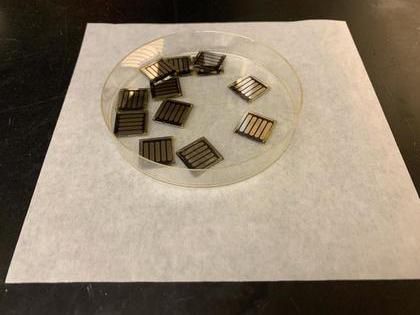Caffeine gives solar cells an energy boost
The idea began as a joke over morning coffee
Scientists from the University of California, Los Angeles (UCLA) and Solargiga Energy in China have discovered that caffeine can help make a promising alternative to traditional solar cells more efficient at converting light to electricity. Their research may enable this cost-effective renewable energy technology to compete on the market with silicon solar cells.

This image shows the solar cells the researchers enhanced with caffeine.
Rui Wang and Jingjing Xue
The idea began as a joke over morning coffee. "One day, as we were discussing perovskite solar cells, our colleague Rui Wang said, 'If we need coffee to boost our energy then what about perovskites? Would they need coffee to perform better?'" recalls Jingjing Xue, a PhD candidate in Professor Yang Yang's research group at the Department of Materials Science and Engineering at UCLA.
The offhand comment led the team to recall that the caffeine in coffee is an alkaloid compound containing molecular structures that could interact with the precursors of perovskite materials--compounds with a particular crystal structure that form the light-harvesting layer in a class of solar cells. Previous attempts to improve the thermal stability of these solar cells have included enhancing the perovskite layer by introducing compounds such as dimethyl sulfoxide, but researchers have struggled to boost the cells' efficiency and long-term stability. No one had tried caffeine.
Realizing they might be onto something, the team set aside their coffee and began investigating further. They added caffeine to the perovskite layer of forty solar cells and used infrared spectroscopy to determine that the caffeine had successfully bonded with the material.
Conducting further infrared spectroscopy tests, they observed that the carbonyl groups in caffeine interacted with lead ions in the layer to create a "molecular lock." This interaction increased the minimum amount of energy required for the perovskite film to react, boosting the solar cell efficiency from 17 percent to over 20 percent. The molecular lock continued to occur when the material was heated, which could help prevent heat from breaking down the layer.
"We were surprised by the results," says Wang, who is also a PhD candidate in Yang's research group at UCLA. "During our first try incorporating caffeine, our perovskite solar cells already reached almost the highest efficiency we achieved in the paper."
But while caffeine appears to significantly improve the performance of cells that utilize perovskite to absorb sunlight, the researchers do not think it will be useful for other types of solar cells. The unique molecular structure of caffeine only allows it to interact with perovskite precursors, which may give this solar cell variety an edge on the market. Perovskite solar cells already have the advantage of being cheaper and more flexible than their silicon counterparts. They are also easier to manufacture--perovskite cells can be fabricated from solution-based precursors as opposed to solid crystal ingots. With further research, Wang believes caffeine may facilitate large-scale production of perovskite solar cells.
"Caffeine can help the perovskite achieve high crystallinity, low defects, and good stability," he says. "This means it can potentially play a role in the scalable production of perovskite solar cells."
In order to continue enhancing the solar cells' efficiency and stability, the team next plans to further investigate the chemical structure of the caffeine-incorporated perovskite material and to identify the best protective materials for perovskites.
Original publication
Other news from the department science

Get the food & beverage industry in your inbox
By submitting this form you agree that LUMITOS AG will send you the newsletter(s) selected above by email. Your data will not be passed on to third parties. Your data will be stored and processed in accordance with our data protection regulations. LUMITOS may contact you by email for the purpose of advertising or market and opinion surveys. You can revoke your consent at any time without giving reasons to LUMITOS AG, Ernst-Augustin-Str. 2, 12489 Berlin, Germany or by e-mail at revoke@lumitos.com with effect for the future. In addition, each email contains a link to unsubscribe from the corresponding newsletter.


























































